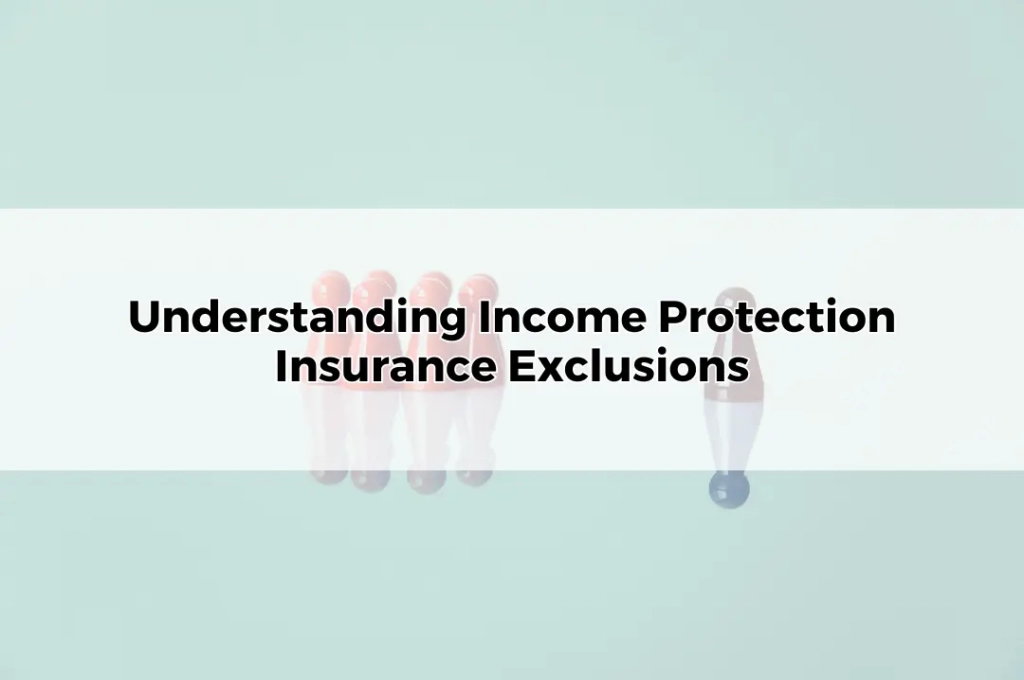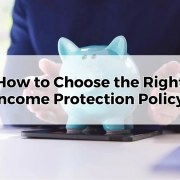Understanding Income Protection Insurance Exclusions
Table of Contents
ToggleIncome protection insurance is a vital safeguard for your financial well-being. It ensures that you continue to receive a portion of your income if you are unable to work due to illness or injury. However, understanding the exclusions in these policies is crucial to avoid unexpected surprises when you need to make a claim.
Exclusions are specific conditions or circumstances under which an insurance policy will not provide coverage. They are an essential part of any insurance contract, helping insurers manage risk and keeping premiums affordable. Knowing these exclusions helps policyholders make informed decisions.
What is Income Protection Insurance?
Definition and Purpose
Income protection insurance is designed to replace a significant portion of your income if you are unable to work due to a serious illness or injury. Typically, it covers up to 75% of your pre-tax income, providing financial stability during recovery.
Key Benefits
The main benefits of income protection insurance include financial security, peace of mind, and the ability to maintain your standard of living even when you cannot work. It ensures that you can meet essential expenses such as mortgage repayments, utilities, and groceries.
Common Exclusions in Income Protection Insurance
Pre-existing Medical Conditions
Most income protection policies exclude coverage for pre-existing medical conditions. These are health issues that you had before the start of the insurance policy. Insurers do this to mitigate the risk of claims for known conditions.
Self-inflicted Injuries
Injuries that are self-inflicted or result from suicide attempts are generally not covered by income protection insurance. This exclusion is standard across most policies to discourage harmful behavior and reduce risk.
Substance Abuse
Claims arising from substance abuse, including alcohol and drugs, are typically excluded. Insurers consider these behaviors to be within the policyholder’s control and therefore not insurable risks.
Specific Occupational Exclusions
High-Risk Occupations
Certain high-risk occupations may be excluded from coverage or may attract higher premiums. These include jobs in industries such as mining, construction, and aviation, where the likelihood of injury is higher.
Hazardous Activities
Engaging in hazardous activities, whether for work or leisure, can also lead to exclusions. This might include activities such as scuba diving, skydiving, or rock climbing. Insurers view these as higher-risk behaviors.
Mental Health Exclusions
Coverage Limitations
Mental health conditions, including stress, depression, and anxiety, are often subject to specific exclusions or limitations. Some policies may offer limited coverage, while others may exclude mental health conditions altogether.
Impact on Policyholders
These exclusions can significantly impact policyholders, especially given the rising awareness and prevalence of mental health issues. It’s important to review and understand how mental health conditions are treated in your policy.
Policy Waiting Periods and Their Implications
Definition of Waiting Periods
The waiting period is the time you must wait after becoming unable to work before your income protection benefits start. This period can range from 14 days to two years, depending on the policy.
Typical Waiting Periods in Australia
In Australia, common waiting periods are 30, 60, or 90 days. Choosing a longer waiting period can reduce your premiums but requires you to have sufficient savings or other income sources to cover the interim.
Understanding the Benefit Period
Definition of Benefit Period
The benefit period is the length of time you will receive income protection payments while you are unable to work. This period can range from two years to up to age 65 or even lifetime coverage.
Common Durations and Their Impact
Common benefit periods in Australia include two years, five years, or until age 65. A longer benefit period provides greater security but comes with higher premiums. It’s crucial to choose a benefit period that aligns with your financial needs and risk tolerance.
Partial Disability Exclusions
Definition of Partial Disability
Partial disability refers to a condition where you are not totally disabled but still unable to perform all your regular work duties. Policies vary in how they define and cover partial disability.
Conditions for Exclusion
Some policies may exclude coverage for partial disability or provide limited benefits. Understanding these conditions is important to ensure you have adequate protection in various scenarios.
Exclusions Related to Sports and Recreational Activities
Professional Sports
Engaging in professional sports can lead to exclusions in income protection policies. Insurers consider professional athletes to be at higher risk of injury, which can result in higher premiums or exclusions.
High-Risk Recreational Activities
High-risk recreational activities, such as extreme sports, can also be excluded. Participating in activities like motocross, base jumping, or competitive martial arts can impact your coverage.
Travel and Overseas Exclusions
Coverage Limitations While Abroad
If you travel or live abroad, your income protection insurance may have limitations. Some policies may exclude coverage outside Australia or impose conditions for maintaining coverage while overseas.
Conditions for Maintaining Coverage
To maintain coverage while traveling or living abroad, you may need to inform your insurer and possibly pay additional premiums. It’s essential to check your policy terms before making any travel plans.
How to Navigate Policy Exclusions
Reading and Understanding Your Policy
Thoroughly reading and understanding your income protection policy is crucial. Pay attention to the exclusions and ensure you know what is and isn’t covered. This knowledge helps you avoid surprises when making a claim.
Asking the Right Questions
When purchasing or reviewing a policy, ask the right questions about exclusions. Clarify any doubts with your insurer or adviser to ensure you fully understand your coverage.
Seeking Professional Advice
Importance of Financial Advisers
Consulting a financial adviser can help you navigate the complexities of income protection insurance. Advisers can provide tailored advice based on your specific needs and financial situation.
How to Choose the Right Adviser
Choose a qualified and experienced financial adviser who understands income protection insurance. Look for someone with good reviews and relevant certifications to ensure you receive reliable advice.
Understanding the exclusions in income protection insurance policies is essential for making informed decisions and ensuring comprehensive coverage. By being aware of common exclusions and seeking professional advice, you can choose the right policy that meets your needs and provides the financial security you require. Regularly reviewing and updating your policy will help you stay protected against life’s uncertainties.









